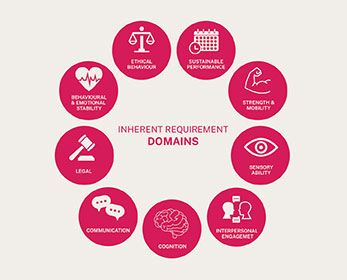All ECU Pre-service Teachers require knowledge of theory and the skills of cognition, literacy and numeracy.
Knowledge and cognitive skills
Introduction
Consistent knowledge and effective cognitive skills must be demonstrated.
Description
Student demonstrates:
- The capacity to locate appropriate and relevant information
- The ability to process information relevant to practice
- The ability to integrate and implement knowledge in practice
Justification
Safe and effective delivery of classroom instruction and early childhood care is based on comprehensive knowledge that must be sourced, understood and applied appropriately.
Reasonable adjustments
Adjustments must ensure that a clear demonstration of knowledge and cognitive skills is not compromised or impeded. Adjustments specific to the individual can be discussed with the course coordinator and/or the ECU Student Equity, Diversity and Disability Service.
Examples:
- Ability to conceptualise and use appropriate knowledge in response to academic assessment items.
- Application of knowledge of policy and procedures in the academic, classroom and early childhood setting.
Literacy (language)
Introduction
Competent literacy skills are essential for professional and effective delivery of teaching content.
Description
Student demonstrates:
- The ability to acquire information and accurately convey appropriate, effective messages
- The ability to read and comprehend a range of literature and information
- The capacity to understand and implement academic conventions to construct written text in a scholarly manner
JustificationThe ability to acquire information and to accurately convey messages is fundamental to ensure safe and effective assessment and learning. The ability to read, decode, interpret and comprehend multiple sources of information is fundamental for the safe and effective delivery of teaching/learning experiences in schools and early childhood settings.
Graduates of accredited courses must meet the Graduate Teacher Standards as specified by the Australian Institute for Teaching and School Leadership (AITSL) standards.
Reasonable adjustments
Adjustments must enable a capacity to effectively acquire, comprehend, apply and communicate accurate information. Adjustments specific to the individual can be discussed with the course coordinator and/or the ECU Student Equity, Diversity and Disability Service.
Examples:
- Can demonstrate the ability to listen/observe to and retain information.
- Can demonstrate the ability to convey a spoken message accurately.
- Can demonstrate the ability to paraphrase, summarise and reference in accordance with appropriate academic conventions.
Numeracy
Introduction
Competent and accurate numeracy skills are essential for effective delivery of teaching content.
Description
Student demonstrates the ability to interpret and correctly apply data, measurements and numerical criteria in a range of contexts.
Justification
Competent application of numeracy skills is essential for effective delivery of teaching content. Graduates of accredited courses must meet the Graduate Teacher Standards as specified by the Australian Institute for Teaching and School Leadership (AITSL) standards.
Reasonable adjustments
Adjustments must enable a capacity to interpret and apply concepts and processes appropriately in a timely, accurate and effective manner. Adjustments specific to the individual can be discussed with the course coordinator and/or the ECU Student Equity, Diversity and Disability Service.
Examples:
- Demonstrating competency in applying basic mathematics knowledge and skills in everyday life and in academic tasks.
- Demonstrating effective use of numeracy skills in matters related to student learning.
- Applying numeracy skills to interpret and solve problems in a range of educational and academic contexts.
Information and Computer Technology (ICT)
Introduction
Information and Communication Technologies (ICT) are processes and tools that are fundamental to accessing course content, current teaching practice, and pedagogical practice.
Description
Student demonstrates knowledge of, and confidence in, the use of ICT in academic, professional and curriculum context.
Justification
Use of ICTs are necessary to provide an effective teaching and learning environment consistent with current pedagogy. Meeting these requirements is necessary for course accreditation and graduate eligibility for registration.
Reasonable adjustments
Adjustments must enable the student to demonstrate a capacity to comprehend, interpret and apply ICT. Adjustments specific to the individual can be discussed with the course coordinator and/or the ECU Student Equity, Diversity and Disability Service
Examples:
- Utilising appropriate ICTs to communicate with peers and lecturers and to gather information in accomplishing academic tasks.
- Using ICTs for accurate, responsive and diligent reports, student profiles, record keeping, lesson presentation material, curriculum plans, assessment and evaluations.
- Using written texts and email professionally at university and during professional experience with students, children, staff, parents and the community.
Interpersonal Engagement
Introduction
Interpersonal engagement is essential to work effectively, respectfully, sensitively and build relationships in community and educational settings.
Description
Student demonstrates:
- The ability to work effectively, sensitively, respectfully and confidentially with children, young people, parents/carers and community members.
- The ability to create rapport with peers, academic and professional staff conducive to effective working relationships.
Justification
The Professional Standards for Teachers in Western Australia require effective, sensitive, respectful and confidential engagement with students, parents and work colleagues and the ability to engage with people from diverse backgrounds and abilities in various contexts. Graduates of accredited courses must meet The Professional Standards for Teachers in Western Australia Standards’ requirements. Inclusion is mandated in the Australian educational context.
Reasonable adjustments.
Adjustments must enable appropriate levels of interpersonal engagement and behaviour. Adjustments specific to the individual can be discussed with the course coordinator and/or the ECU Student Equity, Diversity and Disability Service.
Examples:
- Participating in a respectful and culturally competent manner in tutorial discussion.
- Collaborating, modifying and reflecting on their teaching during professional and field experience in response to student needs and supervisor feedback.
- Interacting with mutual respect, equity and dignity towards others.


